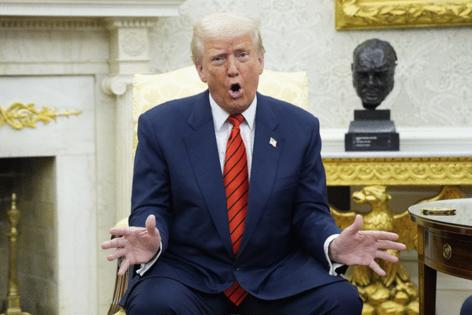Trump bans nationals of 12 countries from US entry
Published in News & Features
WASHINGTON — President Donald Trump signed a proclamation late Wednesday that effectively banned travel to the U.S. from 12 countries, citing risks related to public safety and national security in a move immigration advocates likely will challenge in court.
The proclamation banned from entry nationals from Afghanistan, Burma, Chad, the Republic of the Congo, Equatorial Guinea, Eritrea, Haiti, Iran, Libya, Somalia, Sudan and Yemen.
Trump also partially restricted the entry of nationals from seven other counties: Burundi, Cuba, Laos, Sierra Leone, Togo, Turkmenistan and Venezuela.
The proclamation states the list was developed by the attorney general, the Homeland Security secretary and the director of national intelligence through a process evaluating the screening and vetting of nationals in various counties.
The selected countries were considered deficient in screening and vetting procedures, and others have taken advantage of the visas by refusing to accept back their citizens deported from the United States, the proclamation states.
The justification for the proclamation also includes aspects related to containing illegal immigration. Trump in the proclamation wrote that nationals from some of the countries “also pose significant risks of overstaying their visas in the United States,” which “increases burdens on immigration and law enforcement components of the United States, and often exacerbates other risks related to national security and public safety.”
The new travel ban echoes a proclamation Trump signed during his first term that prohibited travel from majority Muslim countries, which was later expanded to include other nations deemed a risk to security. After a series of legal challenges, the Supreme Court ended up ruling the last version of the travel ban was constitutional and within Trump’s authority as president.
Afghanistan’s presence on the list likely will concern advocates who sought to obtain Special Immigrant Visas for nationals in that country who cooperated with U.S. forces during the occupation but are now seeking to flee after the Taliban took control of the country.
Rodger Pinto, a policy and advocacy associate for the Iraq and Afghanistan Veterans of America, said on March 17 that inclusion of Afghanistan on any travel ban signed by Trump would be a “death sentence” for Afghanistan nationals seeking to escape.
“For our allies In Afghanistan, every single day that they’re in Afghanistan, and even more so if they’re actively working through the SIV visa process and trying to get out of Afghanistan, they’re under threat of death,” Pinto said.
Trump also signed late Wednesday a proclamation prohibiting foreign students from obtaining visas to attend Harvard University, citing an improper vetting process and the university’s receipt of foreign donations. It is the latest escalation of his feud with the Ivy League institution.
“I have determined that it is necessary to restrict the entry of foreign nationals who seek to enter the United States solely or principally to participate in a course of study at Harvard University or in an exchange visitor program hosted by Harvard University,” Trump wrote in the proclamation.
That proclamation cites increased crimes rates and failure to punish conduct violations.
_____
©2025 CQ-Roll Call, Inc., All Rights Reserved. Visit cqrollcall.com. Distributed by Tribune Content Agency, LLC.







Comments